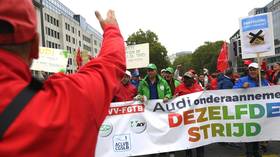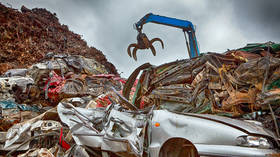Thousands in Brussels protest German car giant’s job cuts

Thousands of demonstrators took to the streets of Brussels on Monday in support of autoworkers who stand to lose their jobs if German carmaker Audi shuts down its facility in the Belgian capital.
Around 5,500 gathered at Brussels-North train station and marched toward the European Parliament, AP reported, citing local police. The lion’s share of Audi’s 3,000 employees in the city, 90% of whom are expected to be laid off as early as next year, were reportedly leading the rally, according to Bloomberg.
The protest came two months after the German automaker announced that demand for its high-end Q8 e-tron, which is assembled in Brussels, had dramatically declined, and warned that the local manufacturing facility suffers from high logistical and production costs.
Earlier this month, Audi Brussels’ spokesman, Peter D’Hoore, said that the plant may not necessarily shut down as the facility could be used to make parts for the company’s other factories.
According to AP, many of those employed at the Brussels plant are engaged in electronic vehicle production, which is being actively touted by the EU as a breakthrough sector amid rising competition with China and the US.
Earlier this month, Volkswagen Group, Germany’s biggest auto manufacturer which owns Audi, ended its domestic job guarantee scheme and announced that it planned to close plants and roll out mass layoffs in the country for the first time in the company’s history. Commenting on the move, CEO Oliver Blume said that the major challenges facing the EU auto industry stem from the pandemic four years ago and Asian competitors entering the market.
Germany's automotive sector has been struggling over the past five years from the country's self-imposed budgetary restrictions that ban stimulus politics as well as the country’s refusal to import cheap Russian energy. The competitiveness of Volkswagen Group and other producers has been undermined by higher energy prices since Berlin lost access to inexpensive gas supplies from Moscow.













